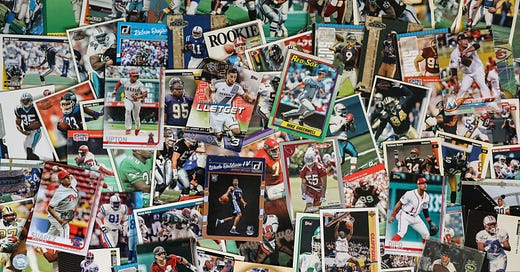Uncut puts podcasting on the blockchain
Creating monetary bonds between creators and their audience.
Photo by Mick Haupt on Unsplash
I know it sounds like Silicon Valley wants to put everything on blockchain, and as I hear quite often, why not just use a database instead? Why pay for that JPG when you can just copy it?
Let me just ask you a question. If I tell you: Here are two rooms. In the first one, you have the original Mona Lisa. In the second one, you have a perfect copy. The first room has an entry fee of $50. The second one is free. Which room would you prefer to visit?
An NFT is not a JPG. It is a certificate that proves you are looking at the original. The one and only.
But it’s more than that.
I had my own epiphany when a friend told me about how he used to buy baseball trading cards in middle school. My friend has never been a baseball fan. So I asked him: why were you spending money on something you didn’t even like? His answer made me realize the potential of NFTs. He was doing it because there were a group of kids in the schoolyard who were trading these cards, and he wanted to get close with them. He bought cards to gain access and connection.
That’s what NFTs are really about.
Beyond the speculation and collectible aspects, the real opportunity with NFTs lies in connection and the formation of new relationships.
NFTs are programmable. The image, video or audio clip you purchase can come embedded with external benefits. What kind of benefits? Anything you can imagine. Access to a newsletter, premium content, a Discord sever, a public recording, merchandise, a private dinner...
NFTs represent an opportunity for podcasters to break a toxic and unequal relationship with traditional platforms that has lasted far too long. This could have a significant impact on the culture that emerges.
If you’re familiar with the relationship that exists between platforms and creators today, you’re aware that creators usually get the short end of the stick. Platforms strive to preserve as much material as possible in order to turn engagement into revenue through advertising or memberships. Podcasters retain control over production (if they are independent), but platforms gain control over how their episodes are distributed and which content is pushed. The majority of content creators make essentially no money from their work, yet platforms record all-time profits.
This has to be changed.
Podcasters can use NFTs to automate transactions without the need for a middleman, which is exactly what we aim to help them achieve with Uncut.
I know, it’s early. We’re still building the product, and it’s impossible to predict its success, but no one else is advocating that podcasters use Web3 capabilities, and I’m curious what would happen if podcasters began to monetize and retain the value they generate. Of course, as a podcaster who prefers to monetize my work directly through listeners, this is personally significant to me. However, the broader cultural implications could be enormous.
I’ve been looking forward to this moment for years, and now it’s here.
Podcasters will regain ownership of their content, the relationship with their audience, and the business that comes with it. This will encourage the creation of different kinds of podcasts. You can suddenly make a living off whatever content makes you happy if you can build a large enough social following.
Of course, this is still true today, but only for podcasters who signed deals with the IP devil in the form of restrictive network or distribution deals - a very small number of people, especially when compared to the number of creators who are revenue-dependent on platforms like YouTube, Twitch, or TikTok.
The internet has spawned a slew of large fandoms, most of which operate in exchange for likes, comments, and shares. As a podcaster, the best you can hope for is that your fans share an episode with a friend or that one of your admirers sends you a message. With NFTs, your fans become your best promoters and distributors since they now have a stake in your future success. You get listeners with ownership. We’ve seen this before with Bitcoin. When you possess something, you want to spread the word about it. I believe we’ll see something similar with content and podcasts.
You might, of course, have any one of a more negative range of viewpoints. However, it is evident that the majority of podcasters are unhappy with the current state of the industry.
Even if Uncut can simply persuade platforms to provide more profitable partnerships, this whole journey may be worthwhile.





I don't know it it's the idea, but I always think smart contract was the best way to replace or augment rss distribution